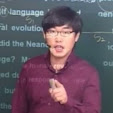All right, as those who have already seen the original music video would know it, After the seventh sentence, the parts of sentence one and two are repeated. So, I don’t have to mention the sentences, no. 1 and 2 again, and you guys only have to review those lectures, right? All right, we’re gonna study the next part, eighth sentence. The first word [nan] is shortened form of [na-neun], which means ‘I’, [ji-geum] is ‘now’, and [se-sang] is ‘world’, and [eui] is a genitive case, and [mun] is ‘gate’, and [ap-e] is ‘in front of’, and [it-seo] is ‘to be at some place’. So, [nan ji-geum se-sang-eui mun ap-e it-seo] is ‘Right now, I’m in front of the gate of the world’. And the next word, [mu-dae] is ‘stage’, and [e] has several meanings case by case as I told you at the previous lecture number 7, right? In this lyric, this [e] is ‘on’. So, [mu-dae-e] is ‘on the stage’. And the next word [o-reul ddae] came from a verb, [o-reu-da], which means ‘to climb, or stand on some platform, or stage’. And as you can see, if this consonant [ri-eul] is placed under [reu], and [ddae] is placed behind, this [ri-eul] and [ddae] is the same as a conjunction ‘when’ in English. So, [mu-dae-e o-reul ddae] is the same as ‘When I’m standing on the stage’. By the way, at this point I got something important to tell you about the difference between Korean and English language. I mean it’s about syntax, the sentence structure. While in English all the conjunctions must have at least a set of subject and verb, Korean language doesn’t have to because we Koreans notice the subject of the sentence, that is to say, an agent of acting by the context, which means sometimes, there are sentences that don’t have subjects. So, actually, in this lyric, [mu-dae-e o-reul ddae] doesn’t have the subject, [nae-ga], that is to say, ‘I’ is omitted. Once again, [mu-dae-e o-reul ddae] is ‘When I’m standing on the stage’ And the next word [deul-ri-neun], which means ‘to be heard’. Actually, [deul-ri-neun] came from [deud-da], which means ‘to hear’, but when we change [deud-da] into [deul-ri-da], this is grammatically a passive expression, that is to say, to be heard, right? And the next word, [hwan-ho-seong], this is a noun, which means ‘cheer’. So, [deul-ri-neun hwan-ho-seong] is ‘Cheer heard’, right? So, [mu-dae-e o-reul ddae deul-ri-neun hwan-ho-seong] is ‘Cheer heard, (when I’m) standing on the stage’. And the next sentence is as you can see the English sentence, ‘Can’t you see my stacked broken thyrsus. And the next word is [i-je], which is the same as [ji-geum]. So, [i-je], and [ji-geum] both are the same meaning, ‘now’. And [nan] is ‘I’. And [da-si] is an adverb, and its meaning is ‘again’. And the next word [tae-eo-na-ne], [tae-eo-na-ne] came from a verb, [tae-eo-na-da], which means ‘to be born’. And the reason why [da] is changed into [ne] is this [ne] is used to express a predicate. The final word, [bi-ro-so] is an adverb, and its meaning is ‘after all, finally, or at last’. So, [i-je nan da-si tae-eo-na-ne bi-ro-so] is ‘Now, I am born again at last’. And two English sentences again, ‘When the night comes mumble mumble mumble’. ‘When the night comes tumble tumble tumble’. And the last sentence is mixed with English and Korean. The letter [reul] behind ‘studio’ is the objective particle. And [chae-un] came from a verb, [chae-u-da], which means ‘to fill’, and if we remove [da] and place [ni-eun] under [u], [chae-u-da] is changed into [chae-un]. The reason why this is changed like this is to modify the noun behind, which is [jeo-eum], and its meaning is ‘low note’ So Studio[reul chae-un jeo-eum] is ‘low note filling the studio’ And finally the last word [deom] is the onomatopoeia, that is to say, the imitating sound of a deep, heavy sound like a drum. And now, we’re gonna go over the whole sentences. [nan ji-geum se-sang-eui mun ap-e it-seo] is ‘Right now, I’m in front of the gate of the world’. [mu-dae-e o-reul ddae deul-ri-neun hwan-ho-seong] is ‘Cheer heard, (when I’m) standing on the stage’. And English sentence, ‘Can’t you see my stacked broken thyrsus. And the next sentence, [i-je nan da-si tae-eo-na-ne bi-ro-so] is ‘Now, I am born again at last’. And Studio[reul chae-un jeo-eum jeo-eum jeo-eum] is ‘low note filling the studio’ Bass drum goes like [deom deom deom]
Search This Blog
About Me

- Kevin Kim
- Geum-jeong-gu, Busan, Geum-gang-ro 555beon-gil 6, South Korea
Popular Posts
K-Voca 10,000 Project-016[0301~0320]
June 24, 2020
K-Voca 10,000 Project-001[0001~0020]
March 09, 2020
Korean Reading 300 - 005
May 13, 2020
Recent Posts
3/recent/post-list
Menu Footer Widget
Copyright ©
SayKorea





